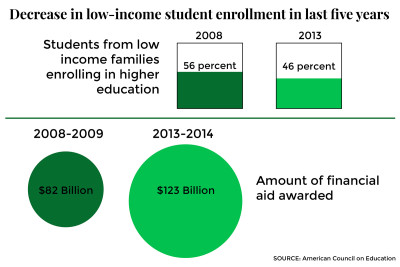
Despite a sizable increase in awarded financial aid, two- and four-year colleges and universities have seen a dramatic decline in enrollment of low-income students, according to a report by the American Council on Education, released Friday.
The report showed that, since 2008, the percentage of students from low-income families enrolling in higher education after high school has declined from 56 to 46 percent. Although college participation is on the decline as a whole, the report stated, enrollment percentages for low-income students are “clearly more volatile.”
The report noted a disparity between this statistic and the amount of financial aid awarded, which has improved from $82 billion in the 2008-09 academic year to $123 billion in the 2013-14 academic year.
The authors of the report hypothesized that college-bound students “may believe that the economic value of higher education has declined” or that “college is out of reach financially.”
Boston University spokesman Colin Riley said in recent years, a college education has become a requirement for most people. Thankfully, he said, there are jobs for students after graduation, but in order to get these jobs, a higher education is required.
“People need to look critically at these things and in an ideal world, opportunity that higher education affords would be available to everybody,” he said. “From my experience, it is, and people have to pursue it.”
Riley said that having a “support network” of people who understand the process of applying to and paying for college makes it easier and eases the pressure it may cause.
“Particularly low-income people need additional support because they may be the first in their family to go to college and they don’t understand the process,” he said, “aren’t familiar with it or have not experienced it.”
Graham Atherton, a junior in the College of Arts and Sciences, said private schools like BU can make tuition more affordable by cutting spending and paying closer attention to the distribution of funds.
“I do think that what BU can do is sort of be a little more intelligent about the priorities of their spending,” Atherton said. “ … I think there might need to be a serious reassessment of where the money’s being spent.”
For Holly Winkelhake, a sophomore in the College of Communication, federal work-study opportunities need to improve so students will have incentive to pay for college.
“It’s not enough to be working 10 hours and only getting paid $9 an hour,” Winkelhake said. “It’s not enough to cover your expenses. You need like, two jobs, and no one can do two jobs. That’s just a lot.”
Olivia King, a sophomore in the School of Education, shared Winkelhake’s sentiment. This summer, she worked in the SED records office and the COM Dean’s office and still struggled to make ends meet, she said.
“BU is really stingy with work study,” King said. “I could only do 24 hours a week, based on the work study I had. I had to find another job and I was working full-time and I could barely afford what they were charging for housing.”
Victoria Almada, a freshman in CAS, said financial aid plays an important role for encouraging low-income students to go to college. However, sometimes the aid is not enough, she said. If Almada fails to receive more financial aid from BU, she will have to transfer to a state school, she said.
“I don’t know how it will change in the next few years. Sometimes it’s scary, with all the loans and everything,” Almada said. “I pick the [classes] that are here and not at my state school that I would have to go back to if I can’t pay in the next few years.”
Christy Osler contributed to the reporting of this article.
Editor-in-Chief. Bostonian by way of Indiana. Excessive Instagrammer. Seltzer addict. Journalism junkie, storytelling fiend.




